Upcoming Equality Now media training
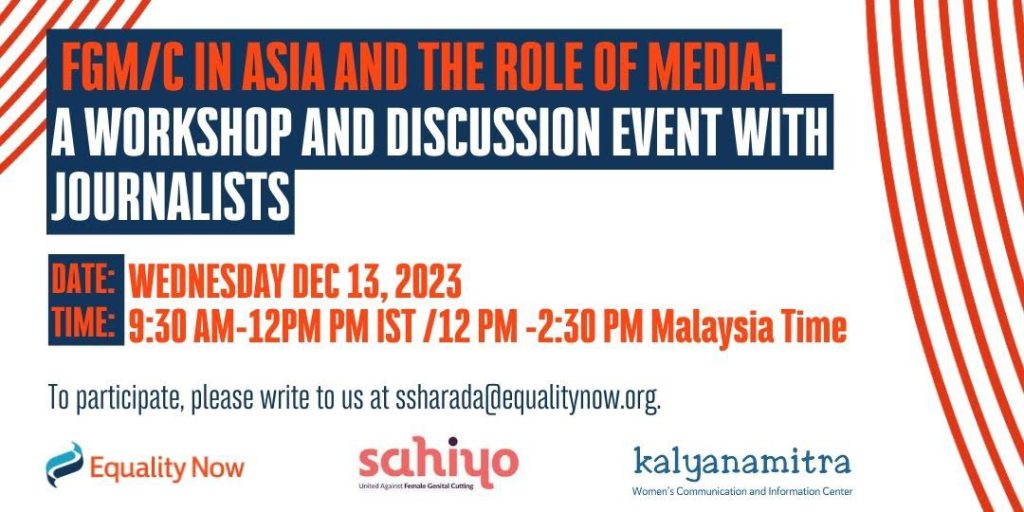
On December 13th from 12-2:30 PM (Malaysia time), Sahiyo India is participating in a media training workshop with Equality Now and Kalyanamitra. The workshop’s aim is to sensitize journalists and media practitioners reporting on the prevalence of FGM/C in Asia in an effective way. The practice of FGM/C has been recorded in Asian countries such as Indonesia, Singapore, Maldives, Malaysia, the Philippines, Thailand, Brunei Darussalam, Sri Lanka, and India. Though widespread, the practice of FGM/C that occurs in Asia continues to receive little acknowledgement, and so does Asia as a region affected by the practice. This dissonance continues to be found in official statistics as well. For example, according to UNICEF, at least 200 million girls and women alive today and in 31 countries have undergone FGM/C. However, this does not represent the accurate picture as it is based only on data from nationally representative surveys. FGM/C is actually known to take place in at least 92 countries worldwide. (Orchid Project) This combined workshop and discussion event will present an overview of fundamental details about FGM/C in Asia. The discussion module will significantly help participants to better understand what constitutes ‘good’ or ‘bad’ FGM/C media coverage, how to ideate better and pitch more effective FGM/C-related pieces, and how to interact with and represent FGM/C survivors in Asia sensitively. Sahiyo India will be represented by Priya Goswami, a co-founder of Sahiyo as well as a co-founder and CEO of the Mumkin App, which aims to use technology to help survivors of gender-based violence. Priya is also the recipient of a National Film Award for her documentary ‘A Pinch of Skin,’ the first documentary from India to speak about the practice of FGM/C. Through the lens of a filmmaker and a communication designer, she will discuss safe and survivor-centric practices for depicting FGM/C. Please email us to receive the registration link for the session at info@sahiyo.org or to Shruti Sharada at Equality Now at ssharada@equalitynow.org.
Reflecting on an Israeli Minister’s decision to not grant asylum for a woman fleeing female genital mutilation/cutting

By Rachel Wine On November 17th, outgoing Israeli Interior Minister Ayelet Shaked forwent the unanimous recommendation from a committee on refugee policy and rejected the asylum request of a young Sierra Leonian woman fleeing female genital mutilation/cutting (FGM/C). The Minister cited several reasons for her decision, many of which included problematic assumptions about FGM/C. I’ll aim to unpack these and provide points of consideration regarding power, politics, and FGM/C. FGM/C is not a “developing countries” issue. In reference to the Geneva Convention relating to the Status of Refugees, Shaked insisted that it was “not designed to address all of the difficulties and hardships suffered by hundreds of millions of people in developing countries.” This false belief that FGM/C only occurs in developing countries can be used to other those affected by the practice and absolve responsibility for taking action. In reality, FGM/C occurs in 92 countries, including the United States. Were this asylum-seeker from Canada or the United States, would Shaked’s decision to deny refugee status stuck? What constitutes a trauma that is “sufficient” enough? And who has the power to declare it as such? There is a discriminatory tone to Shaked’s point about the Geneva Convention too, as she insists “a threshold of some kind… as sufficient grounds for persecution” is necessary for considering refugee status. The WHO has declared FGM/C a human rights abuse, and therefore I do not believe anyone has the right to question the validity of this fleeing woman’s struggle, much less someone with power and influence like Shaked. Considering the Minister’s involvement in Israel’s nationalist politics, it is possible that her decision is part of a larger agenda to keep certain racial groups out of the country, which should disqualify her from making decisions regarding refugees and asylum seekers. FGM/C is not a cultural practice and cannot be compared with male circumcision. To further reinforce her decision, Shaked falsely conflates FGM/C with cultural identity by claiming that “some [forms of FGM/C] are similar or milder than ceremonial male circumcision.” To assign cultural significance to FGM/C also serves as justification for the practice in the name of preserving tradition, much like Shaked is trying to do with male circumcision in Jewish populations. Furthermore, the assumption that FGM/C is a cultural or religious practice denies the reality that FGM/C is globally pervasive, and cannot be lineated with or justified by any one identity, be it religion, culture, or ethnicity. While both culture and religion are large reasons that FGM/C continues, and institutions that uphold the social norm of FGM/C, this harmful practice must be seen as gender-based violence, a suppression of feminine sexuality and freedom, as an attempt to intimidate and control. To deny this truth is to enable the continuation of this violence, and we cannot let culture or religion continue to be an excuse for this human rights violation. No one form of FGM/C is more harmful, and all iterations of the practice are damaging to survivors. Finally, Shaked undermines the trauma inflicted by millions of survivors by claiming: “only a portion of [the forms of FGM/C] have the potential to inflict sufficient serious harm that could be considered persecution.” This statement invalidates the lived reality of every survivor, and reveals Shaked’s lack of knowledge on the practice. This again raises the question of who can be granted authority to make such decisions, and speaks to the need of organizations like Sahiyo, who work tirelessly to educate and dispel falsities that are harmful and dangerous. A note from the author: I often question what my role as an activist should look like. As a white Jewish woman, I know it is not enough to remember the oppression of my own ancestors; as Fannie Lou Hamer said, “nobody’s free unless everybody’s free.” I believe the critical work of activism for a person of privilege such as myself must encompass standing with and supporting those who face oppression in all of its iterations and holding members of your community accountable for problematic and dangerous behavior. When other Jews fail to use their privileges in standing against oppression, and particularly the oppression of non-Jews, I must reckon with the impact of these choices. To be the descendent of an oppressed people, and yet still play a role in the oppression of others, is a disgrace to our ancestors and their legacy of survival; this survival is only made possible through communal care, as well as solidarity with other marginalized groups. I encourage everyone to consider the impact of your choices and the choices of your peers. Hold yourself, and others, accountable. We must use the power we have to protect each other to the best of our ability. Finally, I believe anyone of the Jewish faith who supports Shaked’s decision should turn to this teaching from the Torah: “The strangers who reside with you shall be to you as your citizens; you shall love each one as yourself, for you were strangers in the land of Egypt” (Leviticus 19:36).
Aarefa Johari makes statement at Human Rights Council

On June 20th, Sahiyo co-founder Aarefa Johari submitted an online oral statement on Female Genital Cutting (FGC) in Asia at the United Nations’ 50th Human Rights Council. The statement was made on behalf of the Asian-Pacific Resource and Research Centre for Women (ARROW) and the Asia Network to End Female Genital Mutilation/Cutting. The video statement was aired at an HRC “Interactive Dialogue session with the Special Rapporteur on the right of everyone to the enjoyment of the highest attainable standard of physical and mental health.” It was one of over 75 video statements about health rights made by activists and experts from around the world. Johari’s statement highlighted the widespread prevalence of FGC in several Asian countries, and the lack of resources and attention towards addressing the issue in these nations. Johari called on UN member states to undertake thorough research on FGC in Asia, increase funding towards community-based organisations working to end the practice, and to enact legislation to prohibit all forms of FGC. You can view Johari’s video statement here.
Reflecting on the ‘How to Stop The Rising Trend of Medicalising Female Genital Cutting in Asia’ webinar
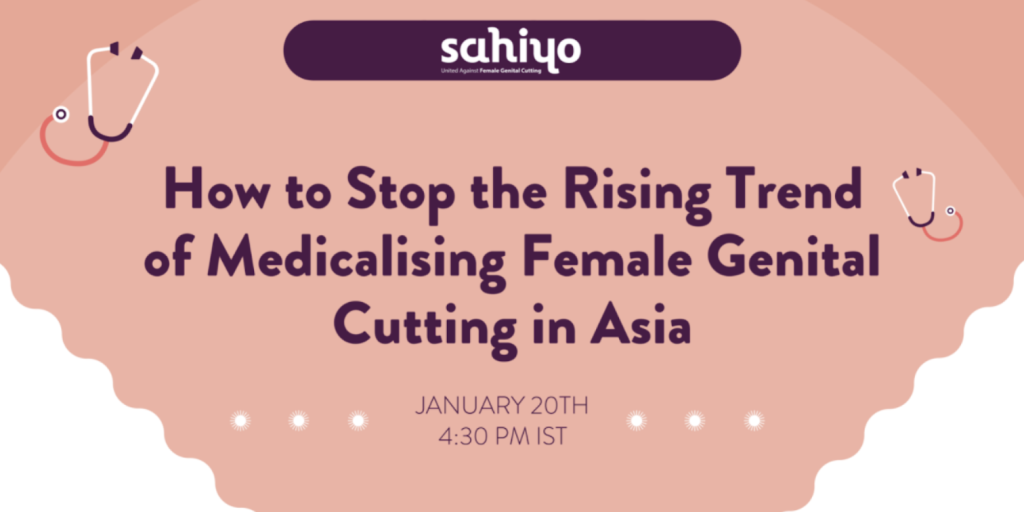
On January 20th, Sahiyo hosted the webinar ‘How to Stop The Rising Trend of Medicalising Female Genital Cutting in Asia’. Organised by Sahiyo’s program’s intern Beth Fotheringham and moderated by Sahiyo co-founder, Insia Dariwala, the webinar featured a panel of experts in female sexual and reproductive health: Saza Faradilla, Kalpana Swaminathan, Ibu Atas, and Dr. Nozer Sheriar. The discussion was centred around two main questions: Why does the medicalisation of female genital cutting need to be stopped and how can we stop this rising trend? Sahiyo Intern Beth began the event by providing a brief overview of female genital cutting (FGC), citing motivating factors for the practice such as social acceptance, marriageability, community belonging, proof of virginity, curbing promiscuity, hygiene, and religion. Though there are no health benefits to medicalised FGC, there is often a misguided belief that the procedure is safer when medicalised. The medicalisation of FGC refers to situations in which FGC is practised by a healthcare professional, whether in a public or a private clinic, at home or elsewhere. More than 200 million women and girls have experienced some form of FGC, with 1 in 3 girls being cut by a health professional. The following video shared during the webinar highlights that many young girls undergo this practice against their will. [youtube url=”https://www.youtube.com/watch?v=k6zpXf6Gm4k”] By courageously sharing her voice and her story, Saza Faradilla gives us an insight into how the practice is carried out without consent. Her story showcases the trauma experienced by survivors who only discover that they have suffered FGC as an adult. This speaks to the aura of silence that surrounds the practice. A lack of questioning falsely leads people to believe that FGC is necessary for socio-cultural or religious reasons. In Singapore 20.5% of doctors carry out FGC, 9.4% of which perform FGC on girls before their first birthday. The preferred age for cutting is between 4-6 months. The backlash Saza receives in her community highlights the need for change. By speaking out against what is perceived to be normal in her community, she recognises that her right to health, the right to physical integrity, and the right to equality and non-discrimination have been violated. Saza’s heartfelt and inspiring activism demonstrates that human rights emerge and evolve through the attempts of ordinary people to challenge injustice. Saza embodies the power of storytelling by sharing stories; hearing a survivor’s experience can definitely shift attitudes and opinions on this issue. The significant lack of information surrounding FGC and medicalization is driving the practice. This means that individuals, including doctors, conform to the norm of FGC without being aware of its inequalities. Pressure to conform to social expectations is a motive behind why healthcare professionals perform FGC. Carrying out FGC in hospital or health settings creates a false sense that FGC is necessary. FGC does not take the bodily integrity of the child into consideration and there is a misogynistic link to FGC being medicalised. Portraying that cutting can be done ‘cleanly, neatly and safely’ directly translates into control of female sexuality and results in the subordination of women. Kalpana expressed how FGC injures much more than the child’s anatomy – any child that suffers unwanted touch will deal with a myriad of mental and psychological effects. However, Kalpana notes that this trauma can also translate into a determination in survivors to fight back and speak out against the wrong-doing they have suffered. Kalpana Swaminathan further develops the argument against the medicalisation of FGC, stating that there is no room for the medicalisation of FGC and the practice cannot be condoned. She explains how the power of culture and tradition can make individuals think and act collectively. Therefore, changing the attitudes of parents and doctors is integral in the campaign to eradicate FGC. How can we stop this rising trend? FGC is not only happening in Asian communities, it is happening everywhere in the world. Sahiyo co-founder Insia Dariwala raised pressing questions such as how do we hold doctors responsible and who is going to do it? Ibu Atas, long standing activist for FGC in Indonesia explains that a firm stance is needed in the work against this practice. FGC is deeply embedded in culture. By campaigning against this practice, we are challenging community attitudes, social norms and their values. Taking immediate action is the best response to the rising trend of medicalising FGC. The message I took away from this webinar ties in with Sahiyo’s objective to recognise and emphasise the values of consent, as well as a child and woman’s right over her own body. Our speakers stressed that there are no justifications for FGC, regardless of who carries it out. Kalpana explains that parental attitudes are influenced by social norms and refers to consent as ‘a can of worms.’ This made me realise that understanding how parental attitudes influence the practice of FGC is key to developing appropriate interventions aimed at eradicating this practice. As put by Ibu Atas, the message must be clear: ‘Don’t touch our genitals.’ Every female should have the right to make autonomous decisions about her own body and reproductive functions. This right is at the core of her basic human rights. Sahiyo would like to thank our panelists for bringing their thought-provoking perspectives to this discussion. You can learn more about the esteemed speakers here. Watch the full event here: [youtube url=”https://www.youtube.com/watch?v=Tqw9OCLmzzU”]
Introducing the Speakers for ‘How to Stop the Rising Trend of Medicalising Female Genital Cutting in Asia’
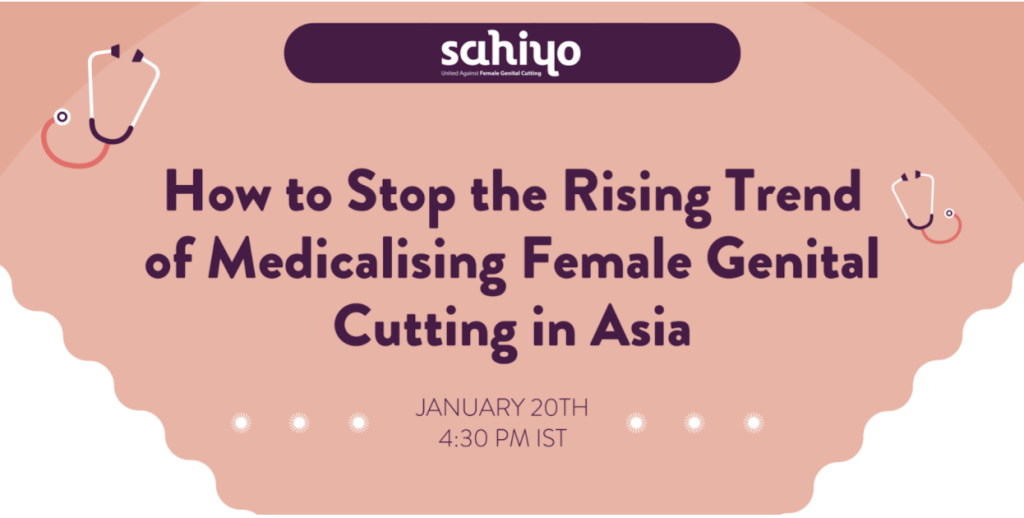
On January 20th at 4:30 IST, Sahiyo will host a webinar titled ‘How to Stop The Rising Trend of Medicalisation of Female Genital Cutting in Asia,’ which will feature a panel discussion with medical experts and gender rights activists who specialise in sexual and reproductive health. The medicalisation of female genital cutting (FGC) is an increasing issue in a number of Asian countries; a stark lack of legislation concerning the practice has contributed to a medical normalisation of FGC. Our panelists will explore medical perspectives about medicalisation and the current ethical debate surrounding this phenomenon, and touch upon the safety concerns and question of consent that underpins much of the controversy. We will be joined by Sahiyo co-founder Insia Dariwala, as well as Saza Faradilla, Ibu Atas, Ajali Nayyar, Dr. Kalpana Swaminathan, and Dr. Nozer Sheriar. If you’re interested in joining our webinar, please see more information and sign up here. About our Speakers: Saza Faradilla: Saza is a co-founder of End Female Genital Cutting Singapore (End FGC SG) whose vision is a Singapore where FGC is obsolete. Some of their activities include organising panels on the social, religious and medical aspects of FGC, support sessions for survivors of FGC, and lobbying political, religious and community leaders to release public statements on FGC. Slowly, but surely, they have managed to broaden the conversation on FGC to include discussions on bodily autonomy, child rights, and consent. Ajali Nayyar: Anjali Nayyar has more than 20 years of experience in global health issues. Her expertise lies in developing integrated strategies to impact health policy and practice in the Global South. She oversees the organization’s programs in emerging markets in Asia and Africa, working through four offices and a network of independent consultants. Prior to joining GHS, she served as Country Director for the Program for Appropriate Technology on Health (PATH) in India. Preceding PATH, she worked with the International AIDS Vaccine Initiative (IAVI) for six years, where she served initially as India Country Director and then as Vice President for Country and Regional Programs in New York. As Vice President, she led field operations and non-research programs in India, Brazil, South Africa, China, Kenya, Rwanda, and Uganda. She is a member of the Confederation of Indian Industry’s (CII) National Committee on Public Health, the Expert Group on Tuberculosis set up by a Forum called Global Coalition Against TB, and the Advisory Group Uniting to End Neglected Tropical Diseases, a WHO mandated organization. Dr. Kalpana Swaminathan: Dr. Kalpana Swaminathan is a Paediatric surgeon and women’s rights activist. She has worked with traumatized children and is concerned with a child’s rights over their body. She also writes along with Ishrat Syed as ‘Kalpish Ratna’, exploring the interface between science and the humanities, and has released a number of books.They are presently working on a history of misogyny. Ibu Atas/Atashendartini Habsjah: Atashendartini Habsjah, affectionately and respectfully known as Ibu Atas, is an inspiring women’s rights activist and independent researcher in sexual and reproductive health and rights. She has been working to end FGM/C in Indonesia since 1994, when, as a lecturer of Women’s Studies at the University of Indonesia, she supported country-level work that influenced the landmark Beijing Declaration and Platform for Action. She began collecting data in the mid-90’s with the authorization of the Indonesia Population Council, starting with West Sumatra and West Java. For the last 10 years, she has been working closely with the Ministry of Women’s Empowerment, the Ministry of Religious Affairs, and the Ministry of Health to stop FGM/C in Indonesia, and in particular, the high medicalization of the practice, in close collaboration mid-wives, nurses, and gynecologists. She hopes that FGM will disappear in Indonesia during this generation and before 2030. Dr. Nozer Sheriar: Dr. Nozer Sheriar is an obstetrician and gynecologist with a longstanding commitment to advocacy for and the promotion of women’s rights and access to safe abortion. He practices at the Breach Candy, Hinduja Healthcare Surgical and Holy Family hospitals in Mumbai. He currently is a member of the Governing Boards of Ipas, the Guttmacher Institute and Centre for Catalysing Change, as well as the Co-Chair of the Medical Advisory Panel, FPA India. He also serves as a member of the Technical Advisory Group on Maternal and Child Health and the Technical Sub Committee for Sexual Reproductive Health of the South East Asia Region of the WHO. As Past Chairperson of the MTP Committee, FOGSI and member of the Technical Advisory Panel, Ministry of Health and Family Welfare, Dr. Nozer participated in the amendment of the MTP Act, the development of the national comprehensive abortion care guidelines, and conducted multicentric research. In acknowledgement of his dedication to and support of women’s healthcare he has been awarded the FRCOG Honoris Causa by the RCOG.
Sahiyo India to host a panel discussion on ‘How to Stop the Rising Trend of Medicalising Female Genital Cutting in Asia’

On January 20th at 4:30 IST, Sahiyo will host a webinar titled ‘How to Stop The Rising Trend of Medicalisation of Female Genital Cutting in Asia,’ featuring a panel discussion with medical experts and gender rights activists from India and Singapore who specialise in sexual and reproductive health. The medicalisation of female genital cutting (FGC) is an increasing issue in a number of Asian countries; a stark lack of legislation concerning the practice has contributed to a medical normalisation of FGC. Our panelists will explore medical perspectives about medicalisation and the current ethical debate surrounding this phenomenon, as well as touching upon the safety concerns and question of consent that underpins much of the controversy. Sahiyo is unwaveringly opposed to medical professionals performing FGC, as we believe it sets an alarming precedent of normalising the practice; we are keen to stress that there are no safe ways to cut a girl’s genitals, and therefore medicalisation is an important issue to address in the work against FGC. During this webinar, we will bring a diverse variety of voices to the panel to discuss the different elements of medicalising FGC, offering their own expert reasons for, and the dangers of, this increasing medicalisation. Our goal is to create a platform to explore the complexities of the shift towards the medicalisation of FGC across the world and to dispel the myth that it is a harmless way to perform the practice. In line with Sahiyo’s mission for women and girls to have autonomy over their body, standing firmly against the medicalization of FGC re-affirms a woman’s right to have control over her body and live her life free of harm. If you’re interested in joining our webinar, please see more information and sign up here.
Orchid Project releases report detailing the pandemic’s impact on female genital cutting
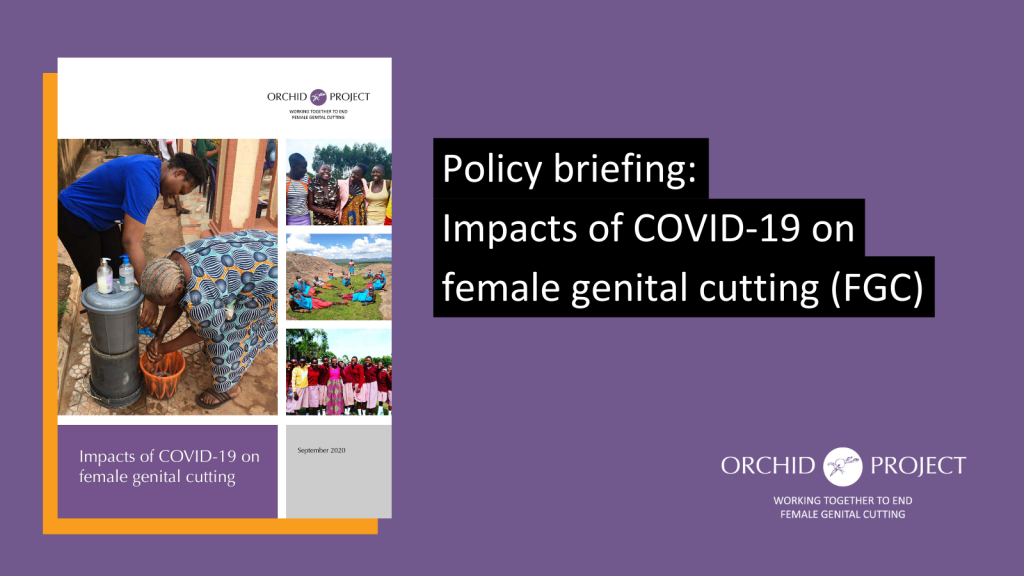
By Hunter Kessous Reports of an increasing rate of female genital cutting (FGC) began early in the pandemic. We are now nine months into the lockdowns and school closures, which have propagated the cutting of young girls. In response, the Orchid Project, decided to further investigate the impact of COVID-19 on the practice of FGC and the movement to end it. The Orchid Project is a nongovernmental organization based in the United Kingdom advocating for the end of FGC globally. Throughout the summer, various grassroots organizations and non-governmental organizations have hosted webinars elucidating the effects of COVID-19 on specific organizations. Sahiyo has shared blog posts reflecting on some of these webinars, which have focused on work in Nigeria and Kenya. There are some key pieces of information shared between these webinars and the Orchid Project’s reports. For example, COVID-19 induced lockdowns and school closures are creating opportunities for FGC to be performed undetected. When girls stay home, they are automatically at a greater risk of undergoing FGC. Furthermore, safe spaces, such as shelters and mental health services, have been closed down. Even medical attention is difficult for FGC survivors to receive, as resources have mainly been diverted to the pandemic. Lack of essential health services and safe spaces for girls and women is a serious concern. According to the report, “Resourcing and programming to end the practice in Asia are extremely limited, so the impact of the COVID-19 pandemic on activities to end FGC have been less significant than in West and East Africa.” The report gives an alarming account of how economic hardship caused by the pandemic has also led to an increase in FGC. In some communities, girls who have been cut are often seen as more marriageable and receive higher bride prices. The bride prices can then be exchanged for food and essential supplies, which has motivated families to cut their girls in this time of extreme economic hardship. Another economic factor involves former cutters who have been returning to the practice, in need of the compensation it will provide. In addition to affecting the practice of FGC, there have also been drastic effects on the movement to end FGC. Nearly all of the groups that were interviewed by Orchid Project for the report have experienced severe restrictions on programming due to stay-at-home and distancing orders. Many organizations have responded by shifting their programming to virtual and media-based formats. However, this is not without its own challenges. Unequal access to technology and internet, along with the often high prices of radio and television communication, have been major obstacles to continuing community dialogues about FGC. The greatest need that the grassroots organizations are currently facing is urgent, flexible emergency funding. This is not to say that the grassroots organizations have not adapted to the dilemmas created by COVID-19. There have been many creative approaches to continuing their important work. Some in-person programming has continued with social distancing and the use of personal protective equipment. WhatsApp and social media platforms are being used to share key information, stimulate dialogues, and share podcasts. Hotlines have been created for at-risk girls; and some activists are even housing these girls in their own homes. The movement to end FGC has certainly taken a hit, but it is not without hope, thanks to the ingenuity and dedication of grassroots activists worldwide. Read the full report by the Orchid Project.
Digital advocacy on female genital cutting in the time of COVID-19
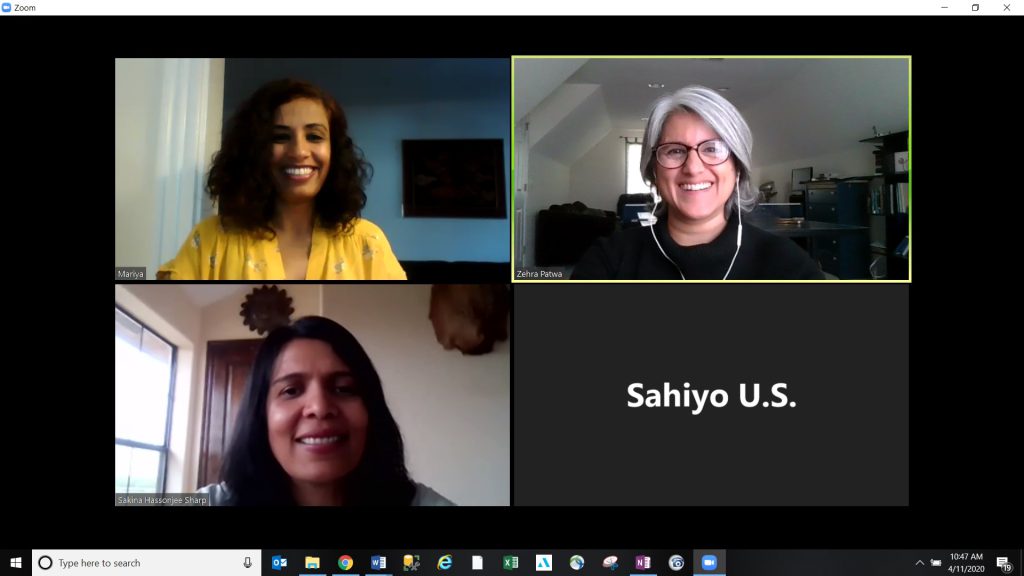
By Miranda Dobson “For many parents in the Bohra community who are thinking about having their daughters undergo female genital cutting, the delay that COVID-19 has caused is likely not a big deal, as it can happen any time from age 7. There is no time limit.” Aarefa Johari is a co-founder of transnational organisation Sahiyo, based in Mumbai, India. “For those who are unsure about whether or not to cut their daughters, this delay could mean there is more time to debate, and hopefully they may change their minds.” Sahiyo works with Asian communities, with a special focus within the Dawoodi Bohra community, which is largely concentrated in India and Pakistan, but also dispersed globally across Europe, North America and Oceania. Sahiyo focuses on ending female genital cutting (FGC), often known as female genital mutilation (FGM), and within the Bohra community as khatna by engaging in a variety of storytelling programs to help elevate dialogue on the issue and build awareness of its harms How is COVID 19 affecting the practice of female genital cutting? Fellow co-founder Mariya Taher, based in Boston, U.S., explained that the impact of the coronavirus pandemic on female genital cutting in the North American Bohra community and other FGC practising communities is likely similar. “It’s difficult to know if FGC is happening more or less right now. Broadly we know that gender-based violence is rising. Domestic violence is rising. The thing that is most immediately concerning is that necessary support services aren’t in place. “There is a poor response from law enforcement, and things like mental health services which were already lacking for survivors of FGC, are even more vital now and just not in place. This is likely the most difficult hurdle right now.” Mariya outlined how the pandemic is also affecting progress around ending FGC at a more structural level. “In Massachusetts where I am, the state law against FGC has been delayed because there are more pressing things to look at right now. Legislation is not a solution in itself but a necessary step towards change, and needs to be supported by community outreach.” Before the coronavirus pandemic hit, much of Sahiyo’s work involved working with activists and community members through in-person retreats and Thaal Pe Charchas – conversations over food. Sahiyo is adapting to the crisis In the current climate, Mariya, Aarefa and fellow co-founders, Priya Goswami and Insia Dariwala, have needed to pivot and work increasingly through technology and digital spaces. “A strength of Sahiyo’s is our digital presence,” Mariya added. “We’re able to still connect with community members in that way, and we held our first ever digital activist retreat in April, which was supposed to be in New York in person. “It was an experiment and we also had men attending for the first time, which was really cool. What surprised me was how engaged people were, and how much they wanted to talk about FGC, at a time when so much else is going on. I think it was very cathartic at a time when people just need an outlet more than anything.” Pivoting to digital advocacy Sahiyo has been able to work to their strengths as communicators at this time, and use digital spaces to convey messages, and to great success. They’ve held webinars with over 300 people in attendance, and continue to share survivor stories on their social channels through a project with StoryCenter called Voices to End FGM/C. Aarefa shared how Sahiyo India is likely to follow suit. “We had planned to have some community events at this time, which haven’t been possible. These could now happen virtually as a way to reach out to people. It’s encouraging how well this went in the U.S.” Sahiyo India has also recently launched the first iteration of an exciting new app. “It’s called Mumkin, and it’s about making difficult conversations possible. We’re excited to be rolling it out at a time when digital advocacy and communications are so important.” Aarefa and Mariya both recognised how COVID-19 is likely to affect communities and their work going forward on a range of levels. “It’s important to acknowledge that we’re living in this altered reality. We can’t just talk about FGC without talking about COVID – it’s not relatable and it doesn’t feel authentic because it’s the issue that everyone is facing,” Mariya told us. “In general, we’re seeing a shift in the social sector. COVID will be a focus for a lot of grants for a while. That’s really important and should be the case. I hope though that it doesn’t mean organisations will force-fit COVID into their work. Of course it’s vital, but it shouldn’t relegate other issues, particularly gender-based violence, which we know is being driven by barriers pandemic responses have put up.” (This interview was carried out via video conferencing and written by Orchid Project’s Senior Communications Manager, Miranda Dobson, speaking to Mariya Taher and Aarefa Johari, co-founders of Sahiyo. The piece was originally published on Orchid Project’s website.)
Asia Network to End FGM/C calls for your participation

Malaysian NGO Asian Pacific Resource and Research Centre for Women (ARROW) and British charity Orchid Project are jointly developing a new Asia Network to End FGM/C, to strengthen movements to end the practice of FGC in Asian communities. To shape this network and its priorities, all interested organisations, activists, and stakeholders working in the region on FGM/C or related issues in Asia are invited to fill out this consultation survey. The closing date for this survey will be 22nd December 2019.
Sahiyo Stories Shown at Reconference In Nepal
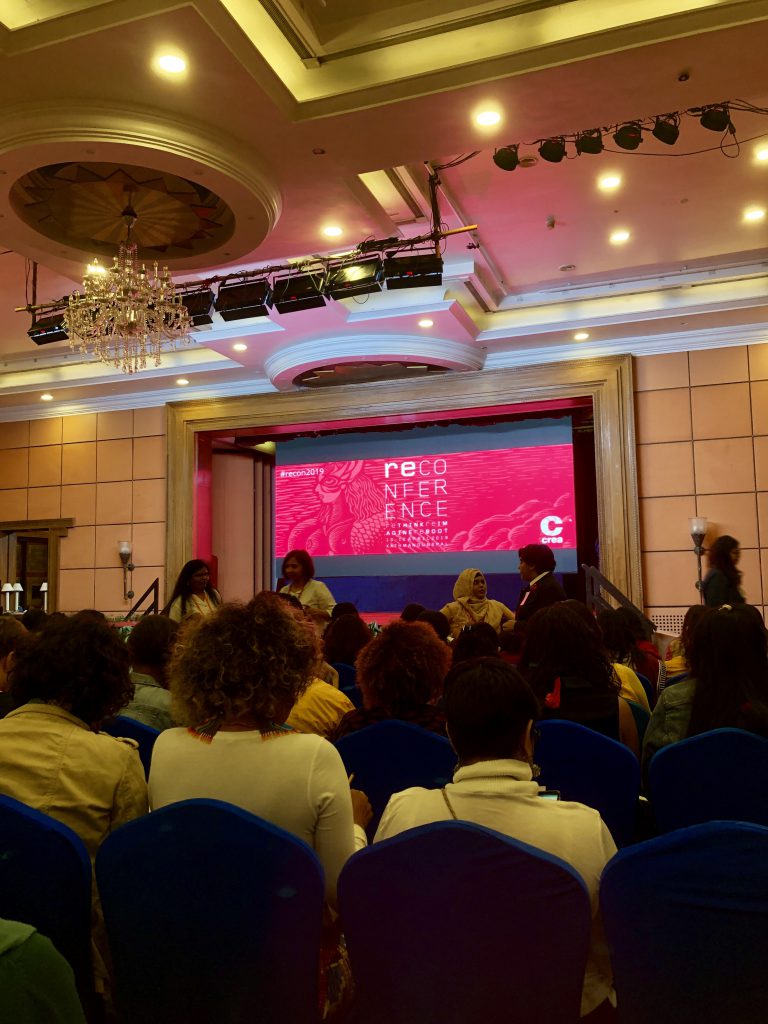
From April 10 to 12, Sahiyo co-founder Mariya Taher attended Reconference, a three-day conference hosted by CREA, to address today’s most challenging socio-political issues and their intersections with feminism, art, and technology by rethinking, reimagining, and rebooting how to build an inclusive feminist vision of justice. Sahiyo Stories, a digital storytelling project organized and created by Sahiyo and StoryCenter, was selected to be part of Day 2 of Reconference, and Mariya presented the collection of 10 digital stories created by women living in the US who had undergone female genital cutting (FGC) or had family members who had undergone it, in order to highlight that FGC is a global issue affecting women of all different backgrounds. Her workshop was the only one highlighting FGC at the three-day conference.
